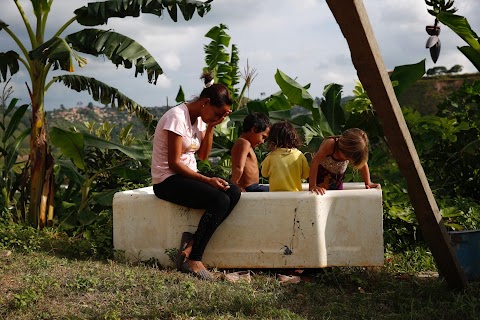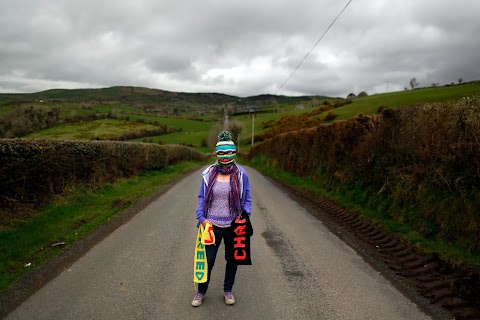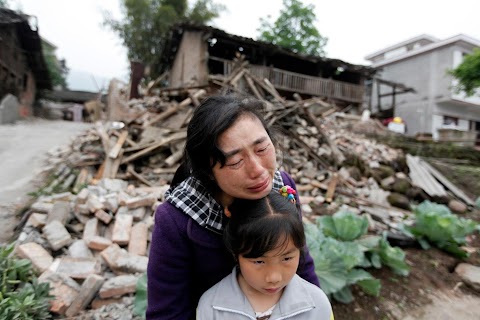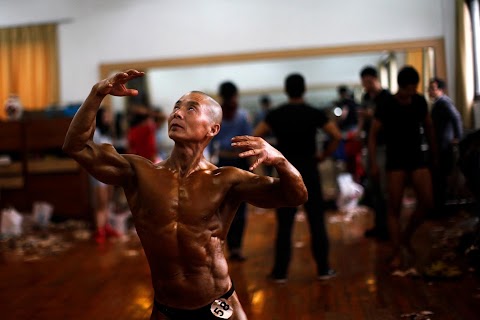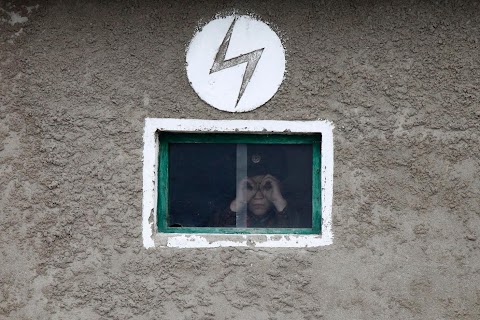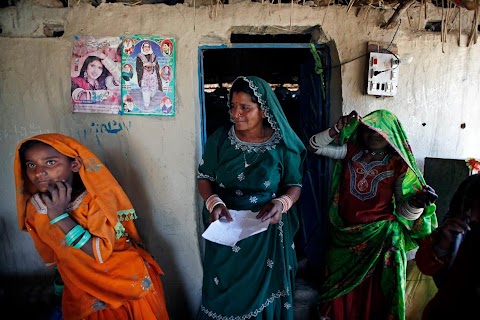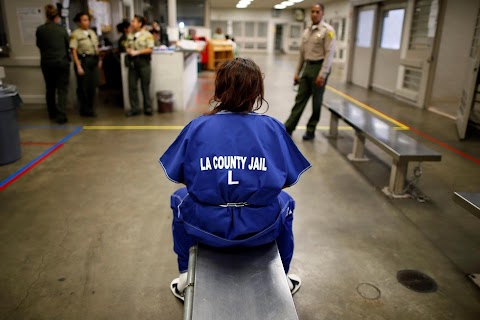
Walking the line
 Lucy Nicholson
Lucy Nicholson
A woman sits in handcuffs after arriving at the Los Angeles County women's jail in Lynwood, California.
Female prisoners have been a fast-growing segment of the U.S. prison population over recent decades. Now, however, a program is in place in Los Angeles County to try and offer an alternative to jail for some women by treating the underlying causes of their crimes, such as drug addiction, abuse, and mental illness.

Judge Michael Tynan (left) has been running the Second Chance Women’s Re-entry Court program since 2007. It is one of the first such schemes in the United States to focus on women, and offers those who are facing jail a chance to enter treatment instead - first staying at a residential facility, then through outpatient therapy - in return for pleading guilty to non-violent crimes.
Here, Judge Tynan gives 49-year-old Victoria Rios a hug after her graduation at the court in Los Angeles. Of the 297 women who have been through the court since 2007, 100 have graduated, and only 35 have been returned to state prison.
"Tynan is a rare judge who offers courtroom hugs."
Victoria Rios, 49, stood up in front of the crowd gathered in the court’s public gallery for her graduation.
She listened as Los Angeles Superior Court Judge Michael Tynan, 76, began her story.
She had started drinking and smoking when she was eight years old. She began taking heroin when she was eleven. She was abused, and went through many abusive relationships. “Prison’s become my permanent friend,” she said.
“If it wasn’t for this program, I don’t know where I’d be. In prison for life or dead,” she said as tears rolled down her face.
Judge Tynan walked over to her and wrapped his arms around her in a bear hug.
“I could have retired 11 or 12 years ago, but I keep coming back because of people like her,” he said.
Tynan has been running the Second Chance Women’s Re-entry Court program since 2007, with Public Defender Nancy Chand, who represents most of the women.
As California struggles with its crowded prison population, the court has pioneered an approach that aims to treat the underlying causes of many women’s crimes such as drug addiction, sexual and physical abuse, and mental illness – most commonly post traumatic stress disorder.
California's 33 adult prisons were designed to hold about 80,000 inmates but now house around 119,000. The U.S. has more than 2 million people in local, state and federal prisons. It has long had the highest incarceration rate in the world.
In an analysis of female imprisonment between the late 1970s and the mid 2000s, the Institute on Women and Criminal Justice found that women were the fastest growing segment of the U.S. prison population. The majority of women in the criminal justice system are non-violent and most have histories of substance abuse, according to the organisation.
The Second Chance Women’s Re-entry Court program offers women who are facing prison a chance to enter treatment in return for pleading guilty to non-violent crimes.
The women stay at Prototypes residential facility for at least six months of treatment, and then come back for at least a year of outpatient therapy. They keep returning to court to give Judge Tynan updates on their progress.
With his brusque humour, he chides them when they slip up, threatens them with jail, and orders them to write 1,000-word essays to think about their actions.
“You’ve got to examine your life in front of other women,” he tells one woman. “It’s hard. No more running away. Don’t feel sorry for yourself. What is it that Nike says? ‘Just Do It!’”
Women fidget nervously in the back of the court, applying lipstick, cradling infants, eating snacks.
For the ones who are sticking to their treatment programs, Tynan is a rare judge who offers courtroom hugs.
“He’s a different kind of judge,” says Vanessa Moreno, 24, who spent 10 and a half years addicted to alcohol, marijuana and methamphetamine. Moreno wrote a letter to Judge Tynan after finding herself pregnant in jail. She is now living at Prototypes and caring for her 2-month-old daughter Makayla.
“He acts out of care and concern, rather than just trying to convict us and throw us away,” says Moreno.
“He’s like a dad some of us never had,” adds Michaella Rines, 29.
Of the 297 women who have been through the court since 2007, 100 have graduated and only 35 have been returned to state prison.
The program costs around $18,000 a woman per year, compared to the $52,000 the state would be spending on keeping them in prison, according to Public Defender Nancy Chand.
“Drug courts work,” says Judge Tynan. “Judicially supervised treatment works, probably better than anything else we know of. But the funding of them is woefully short of where it ought to be.”
“If these programs could get more money, in the long run we could save the county and the state a lot of money, and salvage lives, and that’s the most important thing,” he says.
Emotions run high on graduation day, when the women come to tell their stories before the court, after successfully completing the program.
Judge Tynan put his arm on the shoulder of Hada Smith, 59, as she struggled to speak through her tears.
“I was arrested 92 times,” she said. “I was addicted to heroin for 42 years. I thought I was going to die a heroin addict.” She described being reunited with her family and grandchildren.
“It is so possible for all of us to have this new life,” she said, “and it is the bomb!”
Judge Tynan wrapped up his graduation homily with some advice: “Be kinder than necessary. Everyone else is fighting some kind of battle.”
Slideshow

Women walk along a corridor at the Los Angeles County women's jail in Lynwood.

A woman makes a sandwich in a cell at the prison.

Another woman sleeps on the top of a bunk bed, which was placed in the communal area outside cells because of overcrowding.

Sheriff's deputy Andrea Arroyo talks to a new prisoner.

Hada Smith, 59, cries as Judge Tynan speaks at her graduation at the Second Chance Women's Re-entry Court in Los Angeles. After being a heroin addict for 42 years, and arrested 92 times, Smith is now clean.

Victoria Rios eats a cupcake after her graduation, marking her successful completion of the court program.

Ulonda Johnson, 40, smiles at Judge Tynan after speaking at her graduation.

Kathy Jamieson, 43 (centre), hugs Tammy Fah, 48, as they sit with Fah's son Matthew Stenger, 13, at Prototypes residential facility, where women in the court program stay for at least six months of treatment.

Katrina Larson points to a sentence she wrote as she talks with a councillor at Prototypes residential treatment program.

Vanessa Moreno, 24, changes the diapers of her two-month-old baby Makayla at the Prototypes facility.

Georgina Warren, 48, (right) who lived on the streets for 25 years and is a graduate of the Second Chance Women's Re-entry Court program, hugs Shannel Camel, 49, outside her home in Pomona, California.

